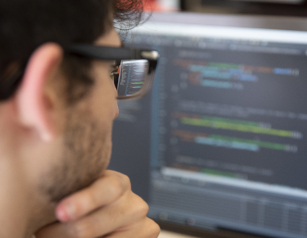 PNRR Intervention Area: Mission 4 - Education and Research
PNRR Intervention Area: Mission 4 - Education and Research
Component: 2 - From Research to Business
Investment: 1.3 - Extended Partnerships with Universities, Research Centres, Businesses, and Research Project Funding
Duration: The project will conclude on 31/12/2025
Total project funding: €114,499,997.53
Proposer: University of Salerno
Cybersecurity to Protect the Economy and Citizens
SERICS aims to enhance data security, protect the economic system, and safeguard citizens' freedoms in the digital age by delving into cybersecurity and its legal and social aspects.
Specifically, the project's actions are aimed at:
- protecting data and services on the web;
- detecting malware and combating cybercrime;
- defending democracy;
- evaluating cyber risks and propose the best countermeasures to limit damage;
- using AI to detect and respond to cyberattacks.
Project Structure and Participation
Foundation Composition
Universities and Research Institutes
- University of Salerno
- Alma Mater Studiorum - Università di Bologna
- University of Bari "Aldo Moro"
- University of Firenze
- University of Cagliari
- University of Milan
- Ca' Foscari University of Venice
- University of Calabria
- University of Genoa
- Politecnico di Torino
- University of Rome "La Sapienza"
- National Research Council (CNR)
- IMT School for Advanced Studies Lucca
- Scuola Superiore Sant'Anna of Pisa
Private Entities
- National Interuniversity Consortium for Informatics - CINI
- National Interuniversity Consortium for Telecommunications - CNIT
- Bruno Kessler Foundation - FBK
- Ugo Bordoni Foundation - FUB
- ENI
- FINCANTIERI
- Intesa Sanpaolo S.P.A.
- Leonardo S.p.A.
- Telsy S.p.A.
Areas of action
- Spoke 1 - Human, Social, and Legal Aspects (leader: National Research Council - CNR)
- Spoke 2 - Disinformation and Falsifications (leader: University of Salerno)
- Spoke 3 - Cyber Attacks and Defences (leader: University of Cagliari)
- Spoke 4 - Operating System and Virtualization Security (leader: University of Genoa)
- Spoke 5 - Cryptography and Distributed System Security (leader: University of Calabria)
- Spoke 6 - Software and Platform Security (leader: Ca' Foscari University of Venice)
- Spoke 7 - Infrastructure Security (leader: Politecnico di Torino)
- Spoke 8 - Risk Management and Governance (leader: Alma Mater Studiorum - Università di Bologna)
- Spoke 9 - Infrastructure Security (leader: University of Rome "La Sapienza")
- Spoke 10 - Governance and Data Protection (leader: University of Milan)
The University of Bologna participates in Spoke 1 and coordinates Spoke 8.
Project team
University of Bologna team
Scientific Coordinator
Prof. Michele Colajanni
Teaching and research staff
- Andrea Acquaviva
- Giacomo Antonioni
- Ozalp Babaoglu
- Raffaella Brighi
- Franco Callegati
- Antonella Carbonaro
- Umberto Cherubini
- Michele Colajanni
- Antonio Corradi
- Gabriele D'Angelo
- Renzo Davoli
- Giusella Dolores Finocchiaro
- Lorenzo Donatiello
- Giulia Fabini
- Giampiero Giacomello
- Cosimo Laneve
- Pietro Manzini
- Simone Martini
- Cecilia Metra
- Edoardo Vincenzo Eugenio Mollona
- Michele Monaci
- Rebecca Montanari
- Mirco Musolesi
- Monica Palmirani
- Marco Prandini
- Daniele Tantari
- Alessandro Tugnoli
Staff hired with project funds
Researchers
- Federica Gerace
- Matteo Iaiani
- Davide Pastorello
- Dario Stabili
Research fellows
- Elisa Botteghi
- Pier Giorgio Chiara
- Marco Grossi
- Antonio Iacobelli
- Oltion Preka
- Antonio Pugliese
- Claudia Federica Righi
PhD students
- Silvio Russo
Involved Departments
- Department of Electrical, Electronic, and Information Engineering "Guglielmo Marconi" - DEI
- Department of Computer Science and Engineering - DISI
- Department of Civil, Chemical, Environmental, and Materials Engineering - DICAM
- Department of Economics - DSE
- Department of Legal Studies - DSG
- Department of Mathematics - MAT
- Department of Political and Social Sciences - SPS
The university research teams have so far focused on the following actions:
- analysing regulatory, legal, and ethical aspects of cyberspace, with a focus on the implications of cybersecurity on fundamental rights;
- developing AI-based digital platforms for autonomous threat identification and risk management in future cyber-physical ecosystems, with particular attention to industries and smart cities;
- strengthening risk management and governance to ensure secure digital services by developing strategies to enhance the cyber and physical resilience of critical infrastructures, in line with European and national directives.
Next Steps
The regulatory analysis conducted so far is crucial for drafting new forms of co-regulation of cyberspace and improving public understanding of these complex issues.
This will be the focus of further studies in the coming months. The solutions devised to protect critical infrastructures and improve governance and security policies regarding privacy and system resilience will be implemented and tested.

